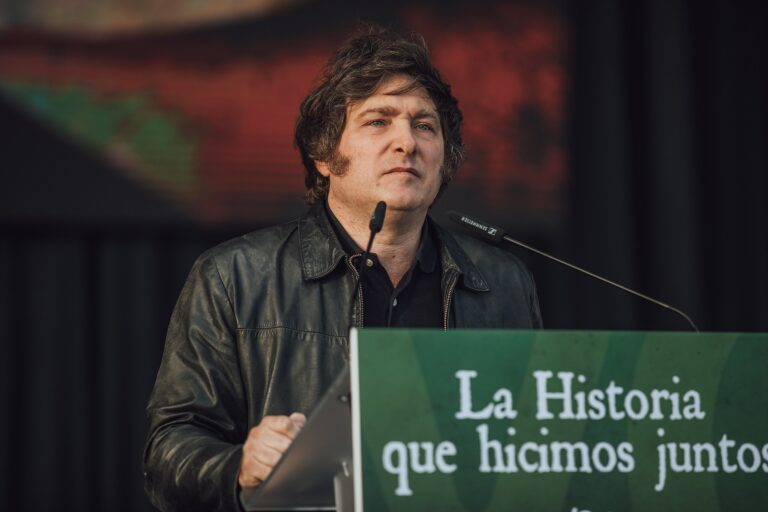Monica Roa, the American-funded lawyer who got a favorable decision for abortion in the Constitutional Court of Colombia, is showing she was not only interested in legalizing some “hard cases” for abortion in her country. How far she is planning to go? We are sure she is the legal face of a whole industry desiring abortion-on-demand, legalized and guaranteed as a human right by all Latin American countries.
Roa has recently traveled to Argentina and her visit had been prepared for very carefully. First, Argentina’s Health Minister, Ginés Gonzalez Garcia, has openly expressed his pro-abortion position among other members of his party. Second, a heated debate took place with a lot of medial coverage over introducing more exceptions to Argentina’s abortion ban during the introduction of a new penal code. And third and a few days before Roa’s visit, two legal cases were presented to the courts asking permission for abortions in cases of the rape of women with mental disabilities.
Coincidence? Of course not. Ignacio Moro, an Argentinean collaborator with the PRI Latin American Office, gave us a comprehensive reading of these events. “Currently, the penal code of Argentina typifies abortion as a crime, according to the constitutional protection of life from conception, but it has a notorious deficiency: In the cases of rape or risk to the mother’s life or health, the penal code has no penalties. It has been so for decades,” he said. “But what do you think if suddenly somebody goes to the authorities asking permission for something not sanctioned bylaw? It happened twice in less than two months with big coverage in mass media. The recent visit of Monica Roa shed light on the whole situation.”
Roa’s Media Strategy: A Model for Export
In a recent interview given to the local newspaper Pagina 12, (see website address at the end of this article), Roa explained openly how she managed to win the decriminalization of abortion decision in Colombia. Through her own words, anyone can easily understand two things:
A mass media strategy to convince politicians is far more important than legal arguments.
Roa’s goal was never to get just some exceptions but to eliminate completely the legal protection of the unborn. In other words, abortion is to become a human right guaranteed by the State.
“The presentation [of the lawsuit] was a result of nine months of work in which we prepared the legal aspects of it. We defined a mass media strategy and we held meetings with some allies, always with a lot of discretion, because the idea was to take by surprise our opponents, mainly represented by the Catholic Church,” Roa stated. She also explained how they studied the way the media has treated the abortion issue since 1976. Her conclusion was to “create” some new social actors or “invite” some authorities to participate in the debate with her pro-abortion messages. In that way, Catholics or pro-lifers would seem like radical minority groups.
Similar Patterns
It is interesting to see similar patterns between Roa’s campaign and Dr. Bernard Nathanson’s story of the legalization of abortion in the USA. They both created a false consensus in the media that gradually changed public opinion. Roa explained what happened in Colombia with public opinion: “A month after we presented the demand, a nationwide survey showed 85% of the people was against any decriminalization of abortion. In March, just before the decision, public opinion was in favor of a partial decriminalization [by 54%]. After the decision, this support increased to more than 60%.”
Of course, we know that is what the mass media were claiming was popular opinion, not necessarily what popular opinion actually was or is. The media always present the pro-choice version of the argument, and with no place for pro-lifers. Judges of the Constitutional Court of Colombia are politicians, and this pressure of mass media pushed them a lot toward a pro-abortion decision. Very easily, Colombian mass media ignored the two million signatures against Roa’s demand, and a march of a million people in Bogota led by Cardinal Pedro Rubiano.
That’s the model Roa is now presenting to like-minded people in Argentina, a model of how to export abortions. When Roa was asked about the legal bases of her demand, she answered they were “recommendations” of some monitoring committees of international organizations. “These committees have said that countries with high rates of maternal deaths and very restrictive abortion laws are violating women’s rights,” she said.
Ignacio Moro concludes that this current situation in Argentina “is not an attempt to change any specific law so much as change public opinion. They want abortion considered not as a crime, but as a woman’s human right, and in that way they have a path toward complete legalization of abortion-on-demand.”
The Argentinean Case
In the beginning of July, the mother of a mentally disabled young woman, pregnant as a result of rape, asked permission for an abortion from a court in Buenos Aires. The abortion was never carried out, even though the court gave its permission, because the baby was 20 weeks along and no doctor wanted to perform it.
A month later, a similar case in the province of Mendoza caught media attention. This time the Provincial Supreme Court made a decision in just three hours, rejecting a legal petition presented by pro-life organizations and deciding to authorize the abortion.
(Pagina 12 website: http://www.pagina12.comar/diario/dialogos/21-71794-2006-08-21.html)








